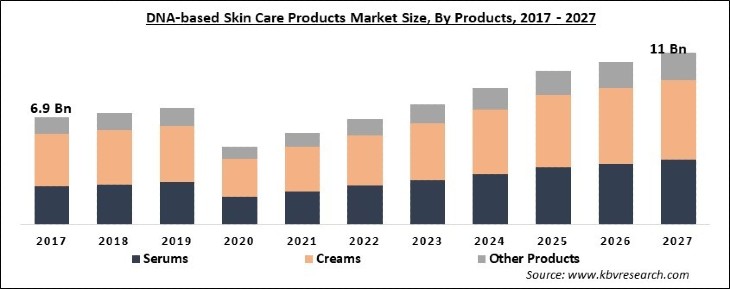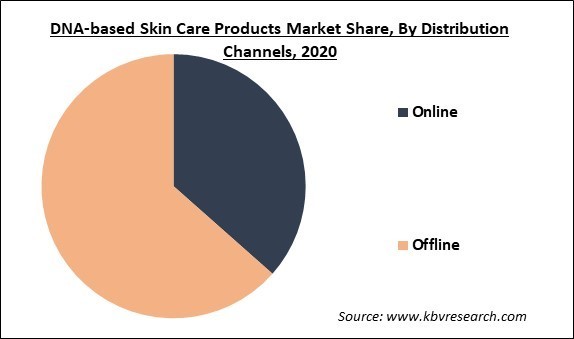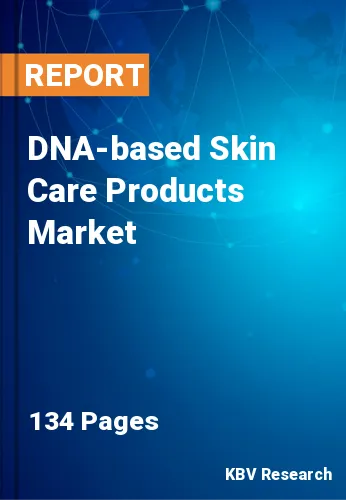The Global DNA-based Skin Care Products Market size is expected to reach $11 billion by 2027, rising at a market growth of 11% CAGR during the forecast period. DNA-based skincare refers to the creation and formulation of customized skincare according to the DNA of the patient. It involves obtaining the DNA by a cheek swab and examining it to recognize the skin’s innate condition across various aspects like inflammation, collagen formation, glycation, antioxidant and sun protection, and others. Taking into account the requirements of the skin of the user is the final phase in the development and formulation of personalized skincare products.
Moreover, DNA mapping is extremely beneficial in customizing the skincare routine. It also assists in recognizing various genetic skin issues. After genetic testing, experts recommend the beauty items that facilitate compatibility with their genes. In the beginning, these tests are generally performed in a wellness clinic; though, they can also be conducted at home according to the convenience of consumers. DNA-based skincare offers various skin advantages that involve inflammation control, collagen formulation, and a high number of antioxidants in the body. In addition, genetic testing refers to an appropriate solution for skincare routine because it offers convenience, is simple to perform, and offers accurate results in less time.
Some of the main catalysts for the growth of the DNA-based skincare market are constant developments in genomics along with the development of infrastructure and increased awareness about these products. Moreover, people are spending more on wellness products and their innate inclination towards looking young is expected to propel the growth & demand for DNA-based skincare products in the market.

The outbreak of the COVID-19 pandemic is an irreversible worldwide health emergency. Due to the global pandemic, almost every type of industry has been impacted. However, the COVID-19 pandemic has positively impacted the growth of DNA-based skincare products. The global pandemic has compelled individuals to reconsider their skincare and personal care items. In addition, consumers are rapidly transitioning towards sophisticated solutions like electronic gadgets, and genetic tests to get quantifiable outcomes with the help of scientific measurements. Consumers are shifting towards these devices for performing genetic tests because of the stringent lockdown regulations formulated by numerous governments around the world. As the global pandemic created high health awareness among the consumers, the demand for DNA-based skincare items has fueled from sanitizers to anti-wrinkle creams.
The purchasing power of people has been augmented significantly especially in the urban areas of both developed as well as developing countries. Extreme climatic conditions in various regions, like Africa and the Middle East are some of the major factors that are responsible for the more use of cosmetic products by people. Concerns about beauty and appearance among working individuals have surged the acceptance of DNA-based skincare products. Customers are becoming more worried and they are trying to avoid parabens as a constituent from their skincare products.
Strict government regulations particularly in developed countries have obliged the companies operating in the natural personal care market to develop natural products compared to chemical products. The operating companies have developed DNA-based skincare products, thus growing the overall consumption of natural personal care in the past few years. Growing awareness about personal appearance and also increasing health awareness will contribute to the growth of the DNA-based skincare product industry. Furthermore, growing disposable income along with enhanced standards of living is expected to drive the adoption of DNA-based skincare products.
Many companies in the market are launching customized products that cater to the needs of different skin types. Moreover, these substitutes are often cheaper than DNA-based skincare products, thereby posing a big challenge to the growth & demand for such products. The companies offering substitutes have a presence on offline as well as an online mode which makes it easier for the consumers to purchase these products. Moreover, these companies are constantly launching unique products in order to maintain their competitive edge.

Based on Products, the market is segmented into Serums, Creams, and Other Products. At present, consumers have the choice to take part in the development of their personalized products due to the advanced data capabilities and technology, thereby facilitating the purchasing decision. Consumers highly cherish the convenience of choosing products that help them to fulfill their aesthetic objectives, and product customization options and services facilitate their lives by decreasing problems throughout the purchasing process.
Based on Distribution Channels, the market is segmented into Online and Offline. The offline distribution channel garnered the highest revenue share of the DNA-based skincare market in 2020. Factor such as growing consumers’ inclination towards testing their genes at wellness and health centers instead of performing such tests at their home using the kits is expected to accelerate the growth of the DNA-based skincare market in the upcoming years.
| Report Attribute | Details |
|---|---|
| Market size value in 2020 | USD 5 Billion |
| Market size forecast in 2027 | USD 11 Billion |
| Base Year | 2020 |
| Historical Period | 2017 to 2019 |
| Forecast Period | 2021 to 2027 |
| Revenue Growth Rate | CAGR of 11% from 2021 to 2027 |
| Number of Pages | 134 |
| Number of Tables | 249 |
| Report coverage | Market Trends, Revenue Estimation and Forecast, Segmentation Analysis, Regional and Country Breakdown, Companies Strategic Developments, Company Profiling |
| Segments covered | Products, Distribution Channels, Region |
| Country scope | US, Canada, Mexico, Germany, UK, France, Russia, Spain, Italy, China, Japan, India, South Korea, Singapore, Australia, Brazil, Argentina, UAE, Saudi Arabia, South Africa, Nigeria |
| Growth Drivers |
|
| Restraints |
|
Based on Regions, the market is segmented into North America, Europe, Asia Pacific, and Latin America, Middle East & Africa. As developing economies are witnessing the increase in purchasing power and becoming globalized, leading companies are expected to witness growth opportunities to enter these markets provided they launch innovative products in comparison to the domestic players. In 2020, APAC and North America garnered the maximum revenue share of the DNA-based skincare market. In addition, consumers in the US and Canada are inclined to the leading e-commerce platforms such as Amazon and Sephora to purchase skincare items as these platforms provide various features like a simple return policy and free home delivery.
Free Valuable Insights: Global DNA-based Skin Care Products Market size to reach USD 11 Billion by 2027
The market research report covers the analysis of key stake holders of the market. Key companies profiled in the report include Imagene Labs Private Limited (Asia Genomics), Caligenix, Inc., EpigenCare Inc. Allogenic AB (ALLÉL®), LifeNome Inc., SkinDNA Clinics, Anake, Skinshift, and DNA Skin Institute.
By Products
By Distribution Channels
By Geography
The DNA-based skin care products market size is projected to reach USD 11 billion by 2027.
The surge in the number of beauty concerns are driving the market in coming years, however, availability of substitutes have limited the growth of the market.
Imagene Labs Private Limited (Asia Genomics), Caligenix, Inc., EpigenCare Inc. Allogenic AB (ALLÉL®), LifeNome Inc., SkinDNA Clinics, Anake, Skinshift, and DNA Skin Institute.
The creams segment acquired the maximum revenue share of the DNA-based skincare market in 2020. As the formulation consists of new-age pharmaceutical active elements, DNA-based skincare creams are boosted as more than just aesthetic or cosmetic products.
The Online distribution channel is the fastest growing in DNA-based skincare items. Moreover, the COVID-19 pandemic has caused the transition in consumer behavior due to the new trend of do-it-yourself (DIY) content and rising online sales of beauty products.
The North America emerged as the dominating region in the DNA-based skincare market in 2020. As consumer-drive, eco-friendly, and clean ingredient formulations are getting high popularity in the cosmetics industry.
Our team of dedicated experts can provide you with attractive expansion opportunities for your business.

